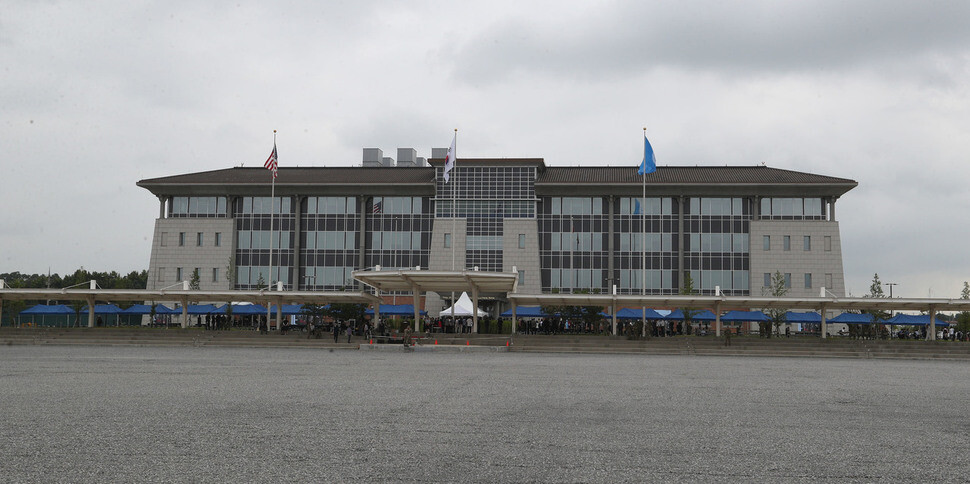hankyoreh
Links to other country sites 다른 나라 사이트 링크
US proposes shortening period of validity for defense cost-sharing from 5 years to 1

During South Korea and the US’ recent negotiations for updating their defense cost-sharing agreement, called the 10th Special Measures Agreement, which will take effect next year, the US reportedly proposed that the agreement’s period of validity be set at one year. Considering that the current agreement is valid for five years, the US’ sudden proposal to reduce that period to one year is putting major pressure on South Korea.
A source who is familiar with the process of the cost-sharing negotiations said on Dec. 27 that the US had proposed making the next agreement only valid for one year (in 2019) during the 10th round of negotiations that were held in Seoul from Dec. 11 to 13. The period of validity was one of the major points being debated in the negotiations, along with the total amount of South Korea’s contribution.
South Korean negotiators reportedly responded to the US’ proposal by saying that they could consider reducing the period to one year but that they needed the total amount of South Korea’s defense contribution to be lowered from the US’ original demand. But the US is reportedly still holding to its demand for a much higher amount. South Korean negotiators are attempting to arrange the next round of negotiations for the middle of Jan. 2019, but the date is still up in the air.
Possible change in US cost-sharing strategy with allies around the world
The US’ intentions are still not entirely clear, but they appear to be linked to a sweeping strategy of readjusting the framework of defense cost-sharing by American allies around the world. US President Donald Trump had repeatedly bashed rich countries for getting a “free ride” and ratcheted up pressure on South Korea, Japan, and the European members of NATO (the North Atlantic Treaty Organization) to sharply increase their share of the cost of stationing American troops in their territory.
Trump says that the US will no longer serve as the global policeman or be a sucker to anybody. Under these circumstances, the US may be trying to buy time to develop a new strategy by striking a short-term, one-year agreement with South Korea and then apply that strategy not only to South Korea but also to Japan and NATO, which are scheduled to have their own cost-sharing negotiations next year.
Following cost-sharing negotiations that had begun in March, South Korea and the US had substantially narrowed their differences about South Korea’s total contribution during the 10th round of negotiations held in Seoul from Dec. 11 to 13, but the negotiations had to basically start over from scratch after higher-ups in the US ordered negotiators to ask for a huge increase in South Korea’s contribution.
Under the 9th cost-sharing agreement, which is currently in effect, South Korea’s share is around 960.2 billion won (US$859.1 million), but for the 10th agreement, reports say that the US suddenly asked for a steep increase, around 50%. The abrupt proposal for the agreement’s period of validity to be reduced from five years to one is also identified as one of the major causes of the negotiations grinding to a halt.
“We continue to use diplomatic channels to talk with the US about additional negotiations in the future and about ways to adjust our positions,” an official from South Korea’s Ministry of Foreign Affairs said during a meeting with reporters on Thursday.
Since the current agreement is set to expire on Dec. 31, there are concerns that the lack of an active agreement, if prolonged, could create problems for the payment of wages to South Koreans working at American military bases around the country. US Forces Korea (USFK) has been pressuring South Korea in various ways, notifying the USFK Korean Employees Union on Nov. 7 that South Korean employees would be put on unpaid leave starting in mid-April 2019 if the negotiations remained deadlocked.
By Park Min-hee, senior staff reporter
Please direct comments or questions to [english@hani.co.kr]

Editorial・opinion
![[Editorial] Japan’s rewriting of history with Korea has gone too far [Editorial] Japan’s rewriting of history with Korea has gone too far](https://flexible.img.hani.co.kr/flexible/normal/500/300/imgdb/original/2024/0422/1717137715201877.jpg) [Editorial] Japan’s rewriting of history with Korea has gone too far
[Editorial] Japan’s rewriting of history with Korea has gone too far![[Column] The president’s questionable capacity for dialogue [Column] The president’s questionable capacity for dialogue](https://flexible.img.hani.co.kr/flexible/normal/500/300/imgdb/original/2024/0422/1517137717613239.jpg) [Column] The president’s questionable capacity for dialogue
[Column] The president’s questionable capacity for dialogue- [Column] Are chaebol firms just pizza pies for families to divvy up as they please?
- [Column] Has Korea, too, crossed the Rubicon on China?
- [Correspondent’s column] In Japan’s alliance with US, echoes of its past alliances with UK
- [Editorial] Does Yoon think the Korean public is wrong?
- [Editorial] As it bolsters its alliance with US, Japan must be accountable for past
- [Guest essay] Amending the Constitution is Yoon’s key to leaving office in public’s good graces
- [Editorial] 10 years on, lessons of Sewol tragedy must never be forgotten
- [Column] A death blow to Korea’s prosecutor politics
Most viewed articles
- 1Samsung barricades office as unionized workers strike for better conditions
- 2[Editorial] Japan’s rewriting of history with Korea has gone too far
- 3[Column] The president’s questionable capacity for dialogue
- 4Korean government’s compromise plan for medical reform swiftly rejected by doctors
- 5[Reporter’s notebook] Did playing favorites with US, Japan fail to earn Yoon a G7 summit invite?
- 6[Column] The clock is ticking for Korea’s first lady
- 7[Column] Are chaebol firms just pizza pies for families to divvy up as they please?
- 8What Israel’s ‘warning shot’ response to Iran means for Middle East tensions
- 9[Column] Has Korea, too, crossed the Rubicon on China?
- 10Korea protests Japanese PM’s offering at war-linked Yasukuni Shrine